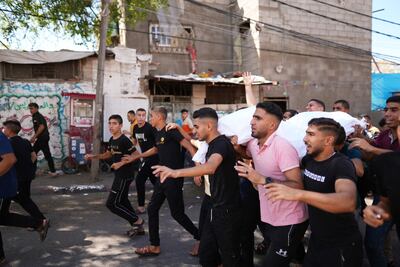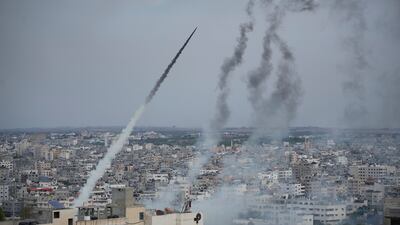The surprise attack by Hamas on Israel has left the government embattled over its security “failure”, but more violence against Palestinians is unlikely to resolve this, experts have told The National.
Prime Minister Benjamin Netanyahu declared “war” after the attacks on Saturday morning, in which more than 500 rockets were launched into Israel and dozens of Palestinian gunmen crossed into the south of the country.
“I have ordered an extensive mobilisation of reserves and that we return fire of a magnitude that the enemy has not known. The enemy will pay an unprecedented price. We are at war and we will win it,” said Mr Netanyahu.
About 700 people have been injured in the attacks, and 44 Israelis have been killed according to the latest figures from Israeli media.
Palestinian authorities have said that more than 198 people have been killed and 1,618 wounded in the Gaza Strip.
The Israeli military said it launched strikes against 17 military compounds and locations connected to Hamas’s leadership in Gaza.
Western leaders have condemned Hamas' attacks and backed an Israeli response, with US Defence Secretary Lloyd Austin pledging to give “Israel what it needs to defend itself”.
Yet questions about how such attacks happened in the first place are emerging – and appear to be changing the game.
However, Husam Zomlot, ambassador to the Palestinian Mission to the UK, warned that unwavering international support for Israel risked escalating the conflict.
“Statements about 'Israel’s right to self defence' will only be interpreted by the most fanatical Israeli government as a green light to commit further massacres against the occupied people of Palestine,” he wrote on X, formerly known as Twitter.
Israel's security 'failure'
Israel’s government is formed by a coalition of right-wing and far-right parties that have been vocal about ensuring the country’s security.
“It is so unprecedented that [Hamas] managed to infiltrate inside Israel, entering towns, villages and kibbutzes,” said Yossi Mekelburg, associate fellow of the Mena Programme at Chatham House.
“Israel was caught asleep in many ways. On any level from an Israeli point of view, it’s a complete failure.”
The attack, named Operation Al Aqsa Flood, comes at a time when Israel has been divided over Mr Netanyahu’s rule and judicial overhauls, with growing calls to resolve the Palestinian issue.
“Hamas sensed that Israel is weak, because of the political weakness of Israel with Netanyahu,” Mr Mekelburg said.
It is believed to be an attempt to jeopardise US-brokered talks between Saudi Arabia and Israel, which would see the two countries establish ties for the first time. An aggressive Israeli retaliation on Gaza, and assaults on its civilians, would make it harder for Saudi Arabia to follow through with a potential agreement.
Yet internal political dimensions are more likely to bear on the scale of Israel’s response, experts say. “In order to re-establish the terms, Israel will retaliate massively,” Mr Mekelburg said.
“They’ve poked the bear, and when you poke the bear it hits back, not always proportionately.”
While Hamas’s objectives are still unclear, the secrecy of the planning could signal a rift within the organisation itself. “Given that it was a surprise attack, one would have to think that only very few people in Hamas knew about this. It begs a question whether all parts of Hamas are fully signed up to this action,” said Chris Doyle, director of Caabu, the Council for Arab-British Understanding.
Questions have also emerged as to whether the Lebanese militant group Hezbollah, which like Hamas also receives Iranian backing, will get involved in the conflict, thus putting Lebanon at risk of war with Israel.
The group described Hamas's attack as a “decisive response to Israel’s continued occupation and a message to those seeking normalisation with Israel”.

Escalating cycles of violence
Yet experts believe that a military solution to the conflict is not possible, as fears emerge of a possible ground invasion of Gaza. “Nobody can win this militarily. You can kill a lot of people but you cannot resolve it. There is only a political solution, but nobody wants to listen,” Mr Mekelburg said.
Instead, Israel's military response could perpetuate existing cycles of violence on the Gaza Strip, which has been blockaded since 2005 by Israel and Egypt. “It’s hard to think that it won’t be a very aggressive action on Gaza,” Mr Doyle said.
He anticipated “massive clampdowns” in the occupied West Bank and East Jerusalem. “Israeli security will be very nervous about potential attacks. Given the nature of this Israeli government, its going to be a very tough crackdown.”
Reports of Israeli civilians and soldiers being held hostage in Gaza could complicate the situation.
The violence was linked to the “long-term failure” on Gaza, said Mr Doyle. “There is a long-term failure on Gaza and on the issue of Palestine. The assumption that you can leave that small strip of land to fester and it can stay contained, it won’t,” he said.
“The international community as a whole has to take stock of this. We have a long-term situation in Gaza which is completely unsustainable, two million under blockade with no horizon.
“Whilst you maintain that there’s an inevitability to have these conflagrations. If we go back to the status quo, we can be assured there will be further lives lost and ruined,” he said.
Without a resolution “things are only going to get worse", he added.
Waseem, a 25-year-old Gaza resident, described scenes of chaos and uncertainty to The National, as he braced himself for the possibility of Israel forces once again entering the Palestinian enclave.
“No one in Gaza has an answer as to what’s happening. We woke up at 6am to the sounds of bombs everywhere,” he said.
“The press and politicians in Gaza are just trying to understand what’s happening but there’s no clear answer.
“My family went to my grandfather’s house which is in the centre of a camp. It’s not safe. Nowhere is safe. In this house we have four children, one of them is a newborn. They are terrified but we are trying to keep them calm.
“We are scared. We know how bad the occupation is."

